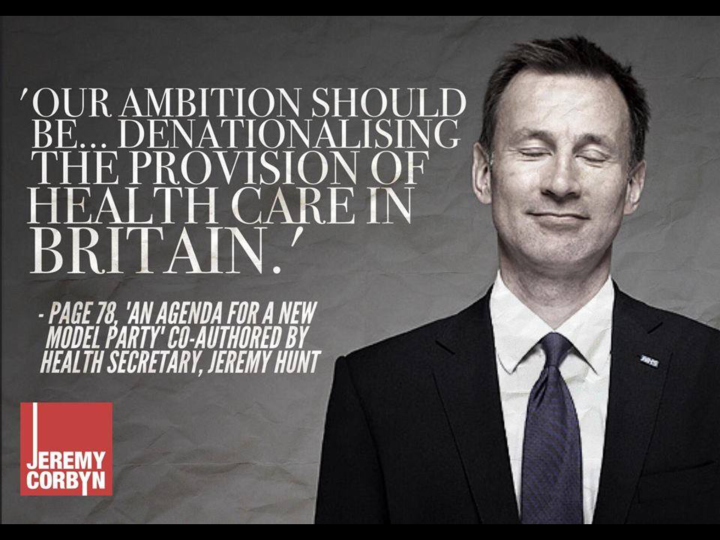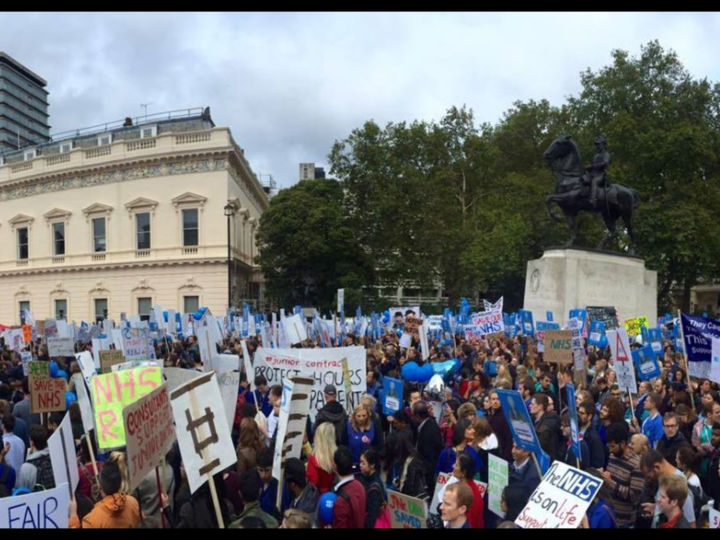DOMINIC PIMENTA 12 February 2016 for OpenDemocracy, Our NHS
Jeremy Hunt’s decision to impose a contract makes as little sense as the rest of his narrative about the junior doctors and a ‘7 day NHS’ – unless you unpick the real story.

[UK] Health Secretary Jeremy Hunt has gone nuclear and yesterday announced that he will forcibly impose his new contract on junior doctors.
Why? His story goes something like this:
“People have less good care at weekends in hospital, because junior doctors are not available. We should have a seven day NHS. We need more junior doctors on weekends but we can’t pay for this, so we will need to make it cheaper. We have to impose a contract to do this.”
But what’s really going on in this dispute?
1. What is a ‘seven day NHS’?
That’s a good question – and no one seems to know. David Cameron thinks it’s about having GPs 24/7. Jeremy Hunt says sometimes it’s about fixing the ‘weekend effect’ which is nearly exclusively emergency care, while other times it’s about routine care in hospitals. NHS management says the ‘7 day NHS’ is about emergency care and sets out 10 clinical standards – most of which are already nearly met, and none of which are about junior doctors.
2. But they keep saying the problem is lack of junior doctors at the weekend?
As a junior doctor, I work 1 in 4 weekends and nights already. Every single patient admitted, 24/7, is seen immediately by a junior doctor – that might be the senior A&E registrar, or the general surgical or medical registrar.
3. Could there be more doctors on the weekend?
Yes, of course. But we don’t have many doctors to begin with; there are 2.8 doctors for every 1000 people in the UK- some of the lowest ratios in Europe. There are already huge gaps where doctors should be, Monday to Friday. In A&E one in eight training positions are empty. In General Practice, one in three are unfilled. Applications for many training jobs continue to drop, and doctors increasingly migrate.
4. So where will ‘more doctors on the weekend’ come from if there won’t actually be any more physical doctors?
Well, you could train more – but it would take seven to 10 years – and applications to medical school are dropping year on year. You could hire more from abroad – but there are no plans to do so. The only remaining source is to move doctors from the week, leaving new gaps Monday to Friday, when activity and admissions are busiest.
In fact due to Hunt’s contract imposition many doctors will also resign, meaning fewer doctors still. This doesn’t seem like a good idea.
5. Why is care less good at the weekend?
We are not sure it is. There been a few big studies that suggest patients admitted at weekends have a slightly higher risk of dying than those admitted during the week. But no-one has properly researched whether that is down to the hospital care – the same studies show patients already in hospital are less likely to die at weekends. It might have nothing to do with hospitals. Patients are generally more unwell and more emergencies come in at the weekend. No-one really knows whether this reflects less GP cover, less hospice access or patients themselves avoiding weekend attendance unless they are really ill.
6. How is this going to be paid for?
Short answer – it isn’t. Long answer – the government announced an ‘extra’ £10 billion for the NHS in the autumn statement- and apparently this will pay for the 7-day NHS (once someone’s figured out what that actually means, presumably). But NHS trusts are running out of money trying to fund the services they already have, and are £2 billion in debt this year already. The NHS asked for a minimum of £10 billion, which includes the £3 billion already announced, just to keep the lights on – not to fund extended services.
So – it isn’t being paid for. Not by this government, anyway. Despite them telling us it was a manifesto commitment.
7. Why can’t the government pay for more doctors throughout the week?
Another good question! We don’t spend a lot of money on healthcare – around 8.5% GDP currently, the lowest in the G7 amongst the lowest in Europe. By 2020 we will be paying 6.7%. That’s amongst the lowest in the industrial world, nearly half what Germany spends, a third of what the U.S. (with their still heavily private system) spends.
It’s not that government can’t pay for it, but they don’t want to.
8. Why did the government impose the contract?
They claim it was to end ‘uncertainty’ for August 2016 – but there really is no reason the contract must be implemented by then. Talks have been going on for three years and contracts are reissued every August. It’s entirely political – to look ‘muscular’, to keep ‘political capital’.
Nearly no one supports imposition other than a few NHS bureaucrats. The Royal Colleges, NHS Trust Executives and the entire medical workforce are all opposed.
In a nutshell, the government want to take away financial safeguards and cut pay at weekends to fix a problem we are not sure is either fixable or genuinely a problem – but we do know will cost a lot of money that isn’t being invested – and won’t actually be fixed because we still don’t have any more doctors – in fact we’ll probably have fewer now, as a result of all this.
Which doesn’t make sense.
9. So why do it?
The contract has many other advantages to the government. It increases pension contributions (making taking over pension liabilities from the NHS more financially viable) and reduces the doctor wage bill for hospitals. It also means lucrative routine work can be done cheaply on the weekends, and for generations to come doctors will cost less. This is the real reason the government want this contract to happen – it will make the system much more attractive to private companies.
10. What’s going to happen now?
After the junior doctors the same terms will go to the consultants, the GPs, the nurses and the other health professionals.
11. And then?
In all seriousness – the end of the NHS. A beleaguered system is now being squeezed just one time too many. The junior doctors have been trying to tell you that the NHS is in desperate trouble – not just from this contract alone, but as the start of a succession of workforce changes.
Private companies have taken 500% more contracts in the past year, the head of the NHS is a former U.S. Healthcare company executive, the last health secretary now works for a private health company having changed the law to make it far easier for private companies to get NHS contracts, and the current health secretary wrote a book idealising the privatisation of the NHS.
Imposing a contract without even knowing if it will make care better, means NHS morale sinking to the point staff feel it couldn’t get any worse. At which point private companies will find it easier sell the idea they will improve terms and conditions and provide magic solutions.
12. What can I do about it?
If you want a free at the point of service public health system, where your taxes fund an efficient and equitable health service that you never have to worry won’t be there for you or your family, then you need to read this and understand. If we do nothing, by 2020 there will be no NHS.
Write to your MP and tell them this is the single issue you will be voting on. Don’t accept anything less than the truth. You know now what is at stake.
Educate yourself more; read more about the health service and the challenges it faces on sites like this one and this one.
Sign this petition. Join up to local save your hospital groups and support their events.
Come to the junior doctor protests. I would love to talk to you.
Keep writing, come to protests, add your voice to every gathering, every social media group, every local council meeting.
Get on a box and shout as loud as you can. This is what democracy should be. Let’s hope it’s not too late.
I am ashamed to say Nye Bevan encountered incredible resistance from doctors at the beginning of the NHS. But that’s not the generation of doctors we have today. We all grew up with the NHS, most of us were born in it, and we all want to defend it as long and as fiercely as we can.
We can’t do it without your help.
Do you think the NHS should be about quality healthcare not soundbites? Become an OurNHS supporter today, and we’ll continue to publish the stories behind the spin.










